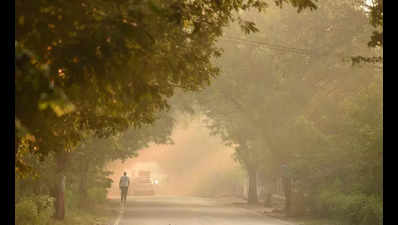Hyderabad: The city is reeling under a severe air pollution crisis as temperatures in parts of the city plummet to as low as 8° Celsius. The Air Quality Index (AQI) has soared past 150 across multiple localities, marking the season’s worst pollution levels. Concentrations of harmful pollutants, including PM 2.5, PM 10, and NO2, have spiked alarmingly, with some areas reporting levels up to 100 times higher than the World Health Organisation’s (WHO) recommended limits.
Localities such as Sanath Nagar, Somajiguda, Gachibowli, Kokapet, Punjagutta, and Old City are among the worst affected. Sanath Nagar recorded PM 2.5 levels of 500 µg/m³, a 100 times higher than the WHO guideline of 5 µg/m³. Similarly, Somajiguda reported 280 µg/m³, while Kokapet, Kompally, and Ramachandrapuram exceeded 200 µg/m³. PM 10 levels were equally alarming, with ECIL registering 204 µg/m³, followed by Gachibowli (160 µg/m³) and Old City (158 µg/m³).
The deteriorating air quality has triggered a spike in respiratory illnesses, with cases of asthma, chronic coughs, and lung infections surging across the city.
Highlighted the dire health implications, Dr Tejas Jogi, a pulmonologist said, “Pollution levels are rising year-round, but winter magnifies the impact. Temperature inversion traps pollutants close to the ground, worsening conditions. PM 2.5 particles penetrate deep into the lungs, weakening immunity and increasing risks of respiratory infections like pneumonia and bronchitis.”
Between 2008 and 2020, Hyderabad recorded an annual average of 5,552 deaths linked to air pollution, with 1,597 fatalities reported in 2023 alone, making it the sixth deadliest city in India for pollution-related deaths. Vulnerable groups, especially children with developing lungs, are at heightened risk.
Environmental experts point to temperature inversion as a key factor exacerbating winter air pollution. Padmaja K, a pollution researcher in Hyderabad, said, “During the night, the ground cools rapidly, trapping cooler air beneath a warmer layer and preventing pollutants from dispersing. Weak winter winds further slow the process, allowing pollutants to accumulate.”
Experts underscore the urgent need for strengthening public transport, promoting cycling and walking, phasing out old vehicles, and cracking down on adulterated fuels are seen as critical steps. Improved traffic management, stricter monitoring of industrial emissions, and regulation of construction activities are also essential, experts pointed out.
“Simple measures, like installing curtains around construction sites and sprinkling water to reduce dust, can make a big difference,” said environmentalist Bhaskar Reddy. He added, “We can’t eliminate pollution entirely, but controlling it is within our reach. Enforcing existing laws and penalising violators are crucial to curb pollution and slow climate change.”








